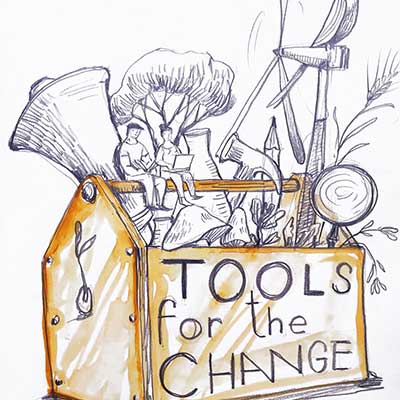
Guide – Advising in ecological transition, why and how?
This guide offers the BREATH systemic approach for implementing advice in ecological transition. It outlines how support for ecological transition can be reconsidered through the prisms of observing, evolving, practicing, and fostering. It is the result of a three-year collaboration between four European partners. The recommendations given here are based on the studies and surveys carried out, the training cycle designed and on the dedicated competency framework called BREATH Competency framework for Advisors in ecological transition. This guide is designed to be transferable and adaptable across a wide range of occupations for learning and teaching purposes.
Target audience: Advisors, Trainers, Supporters in the field of agriculture, energy & sustainable development, building and spatial planning, people who want to accelerate together change towards sustainable systems.
Training cycle
A cycle of four non formal experimental training sessions was done by the partners, in three different European countries, in order to test the modules created to transfer the skills needed for replications of the proposed methods. These activities also helped to strengthen cooperation and networking between organizations and to recognize and validate knowledge, skills and competences to adapt the system to local contexts. The training courses undertaken were:
Training 1. What competences, pedagogical devices and innovative training tools to facilitate change towards sustainable systems? Coordinated by Les 7 Vents, France; Training 2. Nature and agriculture, how to transcend the dominant/dominated relationship? Coordinated by IAMB, Slovenia; Training 3. Bio-architecture and Bio-construction inspiration. Coordinated by Taph Taph, Spain; Training 4. Revisiting the tools available to support spatial planning projects facing the transition. Coordinated by L´Arban. France
A document was created to highlight the training cycle designed and propose an improved model of two days training based on the BREATH systemic approach for advisors in ecological transition. It also provide guidance on how to learn to design training for professionals. This instrument is flexible, reusable and adaptable to any field of work or study.


Disciplinary studies and transfer of methods
It is also important to understand the fields of work or study linked to what we want to develop and the possibility of methods transfer. In our case, we focused on four disciplinary studies about building, spatial planning, agriculture and pedagogical methods themes. We also made additional research to establish pedagogical recommendations. This involved in particular projecting the transfer of methods from one theme to another or from one audience to another The aim of this research was to know and understand the most important thinking and doing lines of these four disciplines, linked to ecological transition and linked to training programs and methods for professional adults. Here we present a summary of our studies.
Breath competency framework for advisors in ecological transition
Breath partners believe that achieving ecological transition is only possible by reconnecting with nature and learning from it. To accomplish this, we must acquire transversal skills, competences, and knowledge. This conceptual framework summarizes the key competences that advisors in the field of ecological transition need to acquire in order to integrate approaches inspired by nature into their professional practices. It is designed to be transferable and adaptable across a wide range of occupations for learning and teaching purposes.

